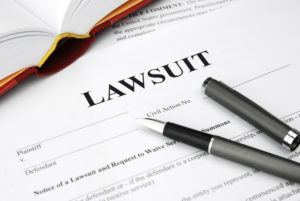
If another person injures you, you could have a claim against them for damages related to your medical expenses, lost income, and pain and suffering. Most personal injury cases are based on negligence claims, including car accidents or nursing home abuse. However, some product liability cases and other claims may be based on strict liability.
Most personal injury cases begin with insurance claims. An injury victim will make a claim against the insurer for the party who caused their accident. If the insurance company does not offer a fair settlement, an injury victim may file a lawsuit against the at-fault party.
Filing an Insurance Claim After an Accident

After an accident or injury, filing a claim with the insurance provider is one of the first steps you take to recover compensation for damages for a personal injury. Filing a claim does not involve the courts. Instead, you are merely alleging that the other party is responsible for causing your injuries and is liable for your damages.
The insurance company typically assigns an insurance adjuster to investigate your claim. The insurance adjuster determines whether the insured did something to cause your injury. If so, the insurance company is liable for the damages.
However, that is not the only matter to be addressed when filing a personal injury claim. Even if the insurance company accepts that it is liable for your damages, it may not agree to pay a fair settlement for your claim.
Insurance companies are for-profit corporations. They are not interested in being fair. Instead, they are interested in protecting their profit margin.
Therefore, an insurance company often undervalues an injury claim to avoid paying large settlements. The result is that you are not compensated for your injury or damages. If that is the case, filing a personal injury lawsuit may be your best option.
Filing a Personal Injury Lawsuit in Pennsylvania

If the insurance company or the other party denies liability, the only way to recover compensation for your damages is to file a personal injury lawsuit.
A lawsuit is a legal action to settle disputes. In most cases, personal injury lawsuits are jury trials. A jury decides whether the defendant (the at-fault party) is liable for your injury, and if so, how much the defendant must pay to compensate you for damages. If either party is unhappy with the jury verdict, they may appeal the verdict.
During the trial, each side presents evidence to support their claims.
To prove that the other party is responsible for your damages, you would need to prove the elements of a negligence claim:
- The other party owed you a duty of care
- The party’s conduct breached the duty of care
- The breach of duty was the direct and proximate cause of your injury
- You sustained damages because of the other party’s conduct
The jury members are the ones to decide whether you have proven your case beyond a preponderance of the evidence. A preponderance of the evidence means that it is more likely than not that your version of events is accurate. In other words, there is more than a 50 percent chance that the defendant caused your injury.
It could take more than a year for a matter to come to trial. The timeline depends on numerous factors.
The lawsuit may be settled at any time before a jury verdict. In many cases, the parties enter settlement negotiations before the trial begins. After extensive discovery and investigations, the parties may be more willing to negotiate a fair settlement instead of leaving it up to a jury to decide.
Is There a Deadline for Filing Personal Injury Claims or Lawsuits?
Time can be a significant factor in a personal injury case. For example, if the other party refuses to pay you for your claim, you would need to file a lawsuit, and there are deadlines for filing lawsuits.
The statute of limitations for filing most personal injury lawsuits in Pennsylvania is two years from the date of the injury. However, a few exceptions to this general rule could shorten or lengthen the time to file a lawsuit. Therefore, it is always best to consult with a lawyer as soon as possible after an injury.
If you miss the deadline for filing a personal injury lawsuit, you lose your right to pursue the claim through the court. In other words, you lose your right to recover compensation for your injuries and damages.
Call Our Philadelphia Personal Injury Lawyer Today for a Free Consultation
You could be entitled to substantial compensation if you were injured because of another party’s negligence or wrongdoing. Contact one of our attorneys at Zavodnick & Lasky Personal Injury Lawyers to request a free consultation with one of our personal injury attorneys in Philadelphia.
